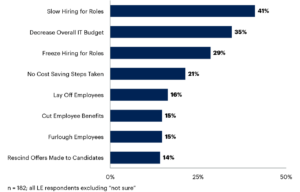Eighty-one percent of large enterprise (LE) CIOs plan to increase their IT headcount in 2023, according to a recent survey by Gartner, Inc. Only 14% expect their IT staff to decrease and 5% expect their headcount to remain the same.
“Attracting and retaining technology talent remain critical areas of concern for CIOs,” said Jose Ramirez, Sr Principal Analyst at Gartner. “Even with advances in AI, Gartner predicts that the global job impact will be neutral in the next several years due to enterprise adoption lags, implementation times and learning curves.”
Only 4% of CIOs surveyed reported AI-augmented worker as a resource producing technology work today.
The Gartner survey was conducted from October through November of 2022 among 501 respondents, 182 of which were LE CIOs in North America, EMEA and APAC region. The LE segment consists of enterprises with a total annual revenue of $1B USD or more.
Why CIOs Plan to Increase IT Headcount in 2023
“Enterprises have undertaken various digital initiatives over the past two years, with operational excellence and customer or citizen experience being the most popular,” said Ramirez. “Still, these initiatives often do not meet enterprise needs quickly enough.” Sixty-seven percent of LE CIOs plan to grow their IT headcount in 2023 by at least 10% to support their enterprise’s digital initiatives.
While CIOs are looking to expand their IT teams, many have faced roadblocks in hiring due to economic conditions. Due to prevailing economic volatility, 41% of LE CIOs report slow hiring for IT roles, 35% report decreasing overall IT budget and 29% report an IT hiring freeze (see Figure 1).
Figure 1. IT Staffing Steps Taken in Response to Economic Volatility

Source: Gartner (June 2023)
“CIOs are taking proactive steps to combat economic volatility by relaxing geographic and role requirements to expand their IT talent pipeline,” said Ramirez. “Some organisations have found success by hiring early-career technologists and providing upskilling opportunities to fill critical technology needs.”
The survey also found that full-time equivalents (FTEs) do the majority of tech work in the enterprise. Full-time IT employees perform 56% of the work, while technology advancements such as automation and AI-augmented work account for just over 9% of work today.
“This reliance on FTEs to meet the demands of digital transformation explain why LE CIOs plan to increase IT headcount in 2023,” said Ramirez.
How CIOs Plan to Upskill IT Talent
With the growing demand for IT talent, the most important candidate qualities LE CIOs look for during the hiring process are having the requisite technical skills, soft skills (e.g., communication, relationship management) and cultural fit. LE CIOs cite cybersecurity, cloud platforms and customer/user experience as the three most critical technical skills in 2023.
Nearly half of LE CIOs plan to invest in training programmes to upskill and reskill IT staff to ensure teams have the relevant roles, skills and capacity to meet enterprise objectives. Forty-six percent of CIOs also plan to establish fusion teams, and the same percentage plan to automate workflow to free up IT time.
“Recruiting the right IT expertise takes time and planning, especially for skills in architecture, cybersecurity, cloud computing and agile software development,” said Ramirez. “Ensure that IT has relevant roles, skills and capacity to meet enterprise objectives. This may require embracing a blended workforce model of IT and business domain roles.”
Gartner clients can read more in “2023 IT Talent Outlook for Large Enterprises.”
Learn about the top priorities for CIOs and technology executives in the 2023 CIO Agenda.










Discussion about this post